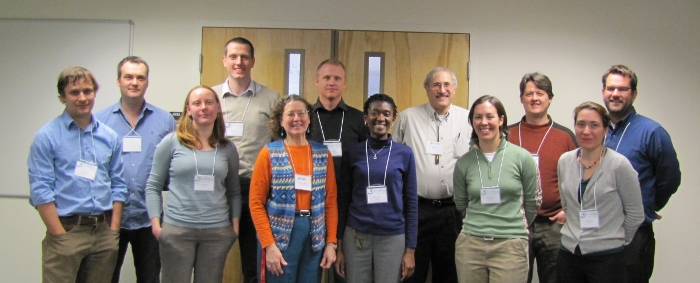NCMI/NIMBioS Workshop:
Infectious Disease Modeling
 |
| (Back row, l to r) S. Hay, S. Riley, P. Gething, L. Gross, D. Smith, D. George; (Front row, l to r) J. Lessler, J. Pulliam, S. Lenhart, B. Gomero, G. Pitzer, C. Viboud |
Topic: Infectious Disease Modeling
Co-sponsors: National Center for Medical Intelligence and NIMBioS
Dates: January 23-25, 2011
Objectives: This workshop was part of a NCMI project to explore the application of infectious disease modeling to expand the forecasting quality of the disease risk assessments of NCMI, an agency within the U.S. Department of Defense. The workshop, one in a series of workshops related to the project, assessed mathematical and computational modeling approaches with potential to meet Department of Defense requirements, with the expectation that the research will provide broadly useful guidance on policy matters outside the focus of the particular stakeholders involved. A key objective was evaluating modeling approaches that forecast infectious disease dynamics and assess disease risks. Ultimately, this project was designed to identify a feasible set of modelling approaches for use in strategic research planning. The objectives directly connect to the long-term goals of NIMBioS to bring appropriate mathematical methods to bear on compelling scientific questions related to national needs, as well as to encourage the development of a cadre of researchers able to develop, analyze and produce guidance from research at the interface of mathematics and biology.
Broader Impacts: Issues related to disease analysis and potential control are central to many public policy decisions on infectious disease. These issues include difficulty and costs associated with obtaining surveillance data in addition to the potential risks and benefits of alternative treatment or disease prevention strategies. Mathematical and computational models have been used extensively to address a variety of issues in epidemiology, with quite different approaches being applied, including the use of mostly statistical models, ones with small numbers of parameters and state variables providing general conclusions, geographic spread models arising from spatial statistical methods, large interacting component models which spatially partition infectious states, and agent-based models which model the behaviours of large numbers of mostly autonomous individuals. The project provides guidance on the use of these varieties of models for certain policy decisions, but the comparison methods developed may be broadly useful in comparing the diverse set of modelling approaches for epidemiological questions outside the scope of the particular policy questions in this project. The project provides support and learning opportunities for graduate students to broaden their exposure to challenging mathematical problems in epidemiology, and provided opportunities for the postdoctoral fellows at NIMBioS to interact with visiting researchers who are leaders in epidemiological modeling.
Products
Publications
Hay SI, Battle KE, Pigott DM, Smith DL, Moyes CL, Bhatt S, Brownstein JS, Collier N, Myers MF, George DB, Gething PW. 2013. Global mapping of infectious disease. Philosophical Transactions of The Royal Society B, 368(1614): 20120250. [Online]
Presentations
Gomero B. 23-25 January 2011. Evaluating modeling approaches that forecast infectious disease dynamics and predict disease risk. Graduate Research Report for the National Center for Medical Intelligence/National Institute for Mathematical and Biological Synthesis's Infectious Disease Modeling Workshop. [Online]
Grants/Proposals
Riley S, Riley P, Bacon D. 2011. Proposal: Near real-time forecasting of influenza dynamics. NCMI. $700,000. Accepted.
NIMBioS Investigative Workshops focus on broad topics or a set of related topics, summarizing/synthesizing the state of the art and identifying future directions. Workshops have up to 35 participants. Organizers and key invited researchers make up half the participants; the remaining participants are filled through open application from the scientific community. Open applicants selected to attend are notified by NIMBioS within two weeks of the application deadline. Investigative Workshops have the potential for leading to one or more future Working Groups. Individuals with a strong interest in the topic, including post-docs and graduate students, are encouraged to apply. If needed, NIMBioS can provide support (travel, meals, lodging) for Workshop attendees, whether from a non-profit or for-profit organization.
A goal of NIMBioS is to enhance the cadre of researchers capable of interdisciplinary efforts across mathematics and biology. As part of this goal, NIMBioS is committed to promoting diversity in all its activities. Diversity is considered in all its aspects, social and scientific, including gender, ethnicity, scientific field, career stage, geography and type of home institution. Questions regarding diversity issues should be directed to diversity@nimbios.org. You can read more about our Diversity Plan on our NIMBioS Policies web page. The NIMBioS building is fully handicapped accessible.
NIMBioS
1122 Volunteer Blvd., Suite 106
University of Tennessee
Knoxville,
TN 37996-3410
PH: (865) 974-9334
FAX: (865) 974-9461
Contact NIMBioS


